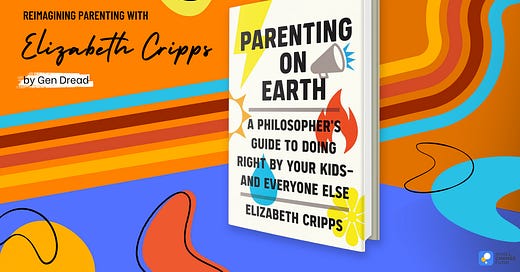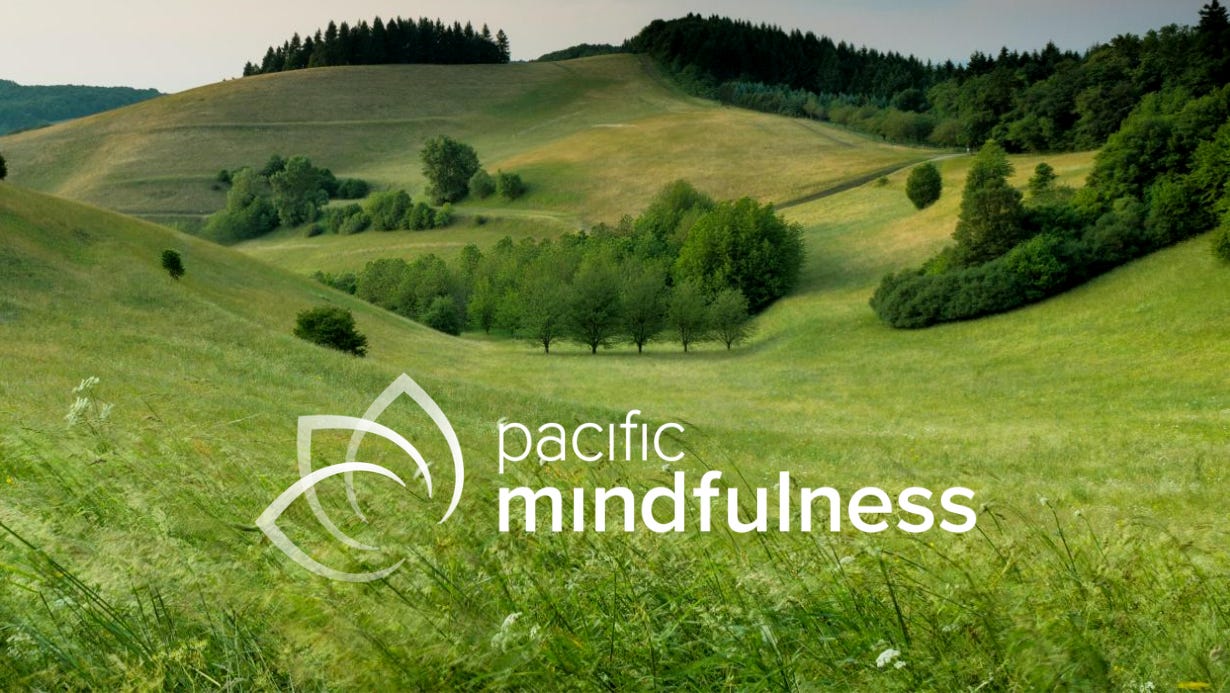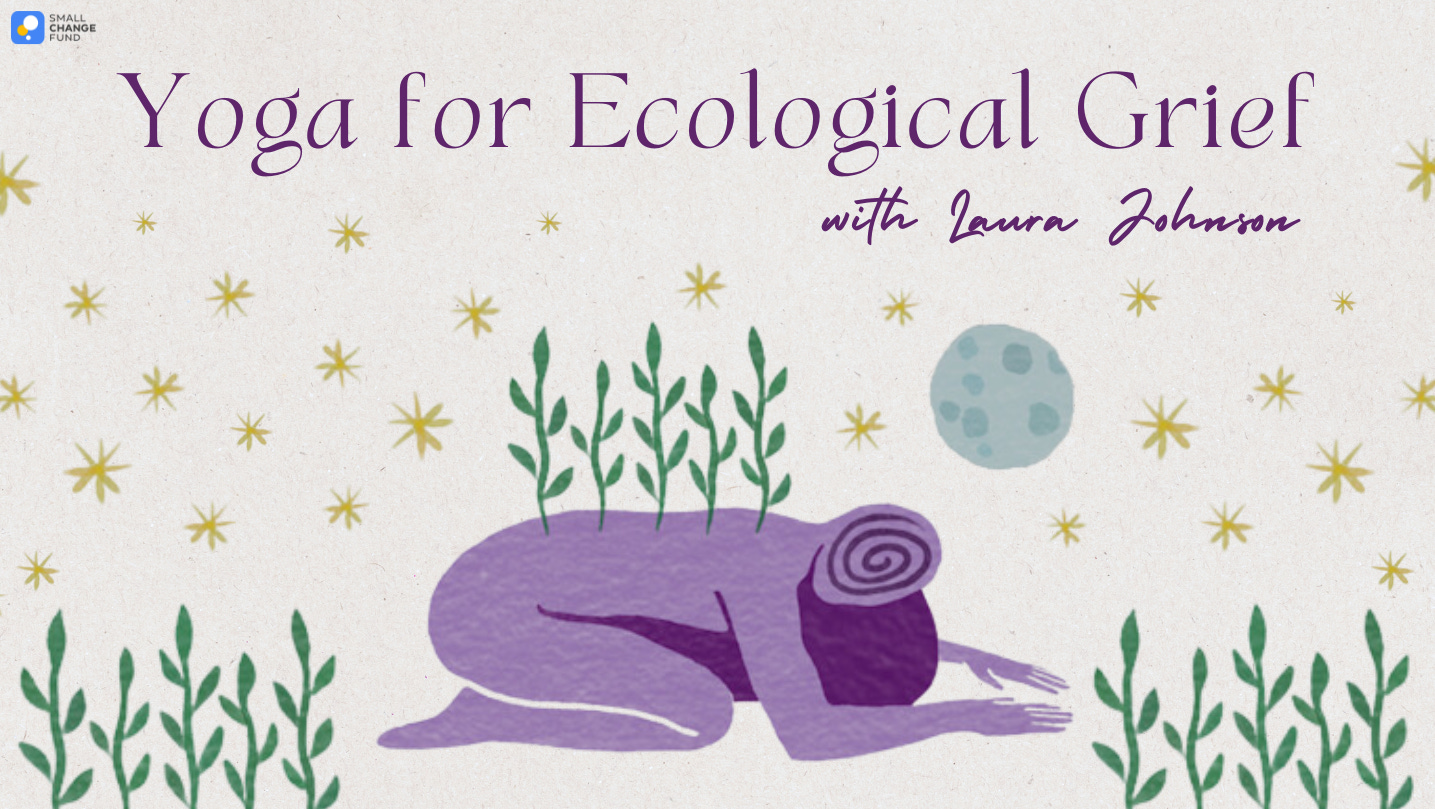The moral duty we have to kids growing up in the climate crisis
Philosopher Elizabeth Cripps’ new book asks us to reimagine parenting
Hi there!
Welcome to Gen Dread, a newsletter about how the climate crisis is making us feel, why that’s happening, and what we can do about it. Subscribe now to find community, comfort, and practical coping strategies from experts all around the world.
Here in the Global North, we’ve got parenting completely wrong.
That’s how Elizabeth Cripps opens her new book, Parenting on Earth: A Philosopher's Guide to Doing Right by Your Kids – and Everyone Else, which is out this week.
As Earth Month leads us to Earth Day on April 22, we’ve been thinking a lot about what shape our planet will be in for future generations. So it seemed like the perfect moment to talk to Elizabeth about the moral responsibility we have to children growing up in the climate crisis. Elizabeth is a writer, mother, and moral philosopher. She's a senior lecturer at the University of Edinburgh, and this is her second book.
Okay so: why do you think parents in the Global North have parenting completely wrong?
EC: I think it’s time to think in a more transformative, expansive way about what we mean by “good parenting”, or “loving parenting”. We tend to think that what we should be doing for our children is worrying about the day-to-day stuff (which of course we have to do) and focusing on their economic or financial wellbeing, or their prospects. We think about the here and now, and when we do think about their future it’s, “how do I educate them to get a good job?” or “what opportunities can I get them?” and we often think that that gives us a free pass. Because as parents it’s legitimate to care so much about our children, we tend to think well, if we’re focused exclusively on our own children and not worrying so much about people suffering in different parts of the world and our moral duty to those distant strangers, then that’s fine because being a good parent means prioritizing your own child.
But that’s a mistaken way of thinking about it. We’re parents but we’re also still moral agents. There’s a limit to how far we can legitimately just prioritize every last thing our child wants above everything else in the world. Because if we do that – if we just focus on the here and now, if we just worry about getting all the consumer goods that we think our children need, if we just worry about their financial prospects – we’re ignoring the much bigger picture, which is that the way that we live, and the way that we’re raising our children to live, all of that is creating a situation where their generation is massively threatened by climate change. We need to think less at the individual level – less worrying about paying school fees to make sure my child gets the best possible job they can get – and more about well, what could we, as parents between us, do, to protect the future that all of our children will inherit?
In the book you say: “It’s no longer enough to think only of the harm I do. I also have to consider what we do.” And of course, this also means imagining the good we can do together. How can we best model this idea of collective responsibility to our kids as they grow up?
We can no longer think “as a human being, I just worry about the harm I do and the good I do directly”. We have to think about how almost everything we do is contributing to harm like climate change. So what becomes particularly important is working together, being activists with other people and other parents to change the political systems, to change the institutions that at the moment are limiting our choices, and limiting our children’s choices.
When it comes to modeling this for our children, there are two things: firstly, we need to be activists ourselves, because if we leave it to our children’s generation it’s going to be too late for a lot of things. So being actively involved as parents, using the particular talents and skills that we have, using the networks we have as parents – there are amazing parent climate activists out there. The other thing is that we need to raise our children to recognize the challenges they face, to recognize the problems facing their generation, and to teach them to be able to face them. To motivate them to try and not just accept the society that they’re handed down but to actually challenge it and to want to be an advocate for change themselves, even though yes, this is incredibly unjust.
You say we need to raise kids to question the status quo because “neutrality is a myth”. Can you explain why?
We owe it to other people, if we are moral agents, to raise the next generation so that they will actually be good global citizens. They’re going to have a big influence on what happens to each other and to the world in the future. Most parents would accept that we need to raise our children so they’re not going to do serious harm to other people, but now it’s about taking that one step further, to recognize that actually, not doing harm now is a collective thing. It’s about what you’re part of, and being prepared to challenge the harmful systems you’re part of.
I did some reading about raising anti-racist children and raising feminist children, and one thing that became very apparent to me is that it’s very easy, especially if you’re a privileged parent, to say, “well, I’m not going to pre-determine what my child thinks – I want them to be autonomous. I’m going to let them grow up to choose the values that matter to them. I’m not going to brainwash them”. But if we don’t teach them progressive values, anti-racist values, feminist values, then what are they going to pick up from the media, what are they going to pick up from other people, what are they going to pick up from influencers like Andrew Tate? They’re actually going to pick up this incredibly toxic, misogynistic, racist culture, this culture that can potentially include climate denial. So there’s no such thing as being neutral when we raise our children. If we decide not to teach them to be anti-racist, to be feminist, we are essentially leaving them to be taught to be the reverse. We can’t opt out of this.
Our readers vary wildly in terms of race, class, sexual orientation, etc. How do you think your privilege or marginalization should affect or change the way you parent as a moral agent?
One important thing for privileged parents when it comes to activism is inclusive activism. So there's a huge amount of climate activism that's been led, for example, already, by Indigenous women. By women of color, including mothers of color who've really fought for justice. So I think as relatively privileged parents, it's not our responsibility or place to rush in and say, okay now we’re finally worried about this because it's gonna affect our children and so we are gonna just focus on that and try and take this over. It's about listening to and amplifying those voices for justice that are already out there.
We’ll have more of our conversation with Elizabeth Cripps in our next newsletter edition, coming tomorrow! If you liked reading this, feel free to click the ❤️ button on this post so more people can discover it on Substack 🙏🏼
And in the meantime, Elizabeth’s book is called Parenting on Earth: A Philosopher's Guide to Doing Right by Your Kids – and Everyone Else and it’s out this week. Our US readers can get 15% off the book via the Penguin Random House website by entering the code READMIT15.
Making Waves
Cultivating a climate mind means learning how to show up as our most resilient and compassionate selves for the world that we love, and reconnecting again and again. This work is essential whether you are on the frontlines of climate action or you are only beginning to realize the extent of our predicament. This important five-week series by Dr. Sarah Ray, a certified mindfulness facilitator with the UCLA Mindfulness Awareness Research Center, weaves together the most current research on mindfulness and climate change, social justice principles of collective resilience, and guided meditation to explore the role of equanimity, attention, compassion, joy, and purpose in the polycrisis. This series will be held online via Zoom every Tuesday Afternoons, 4 - 5:30 PM PT, from May 2nd to May 30th.
In the face of global climate change, how might we support the mental health of young people? Hear from the Hopelab team on Wednesday, May 3rd at 1 - 2:15 PM PT as they share learnings from an exploratory project examining the intersection of climate change and Gen Z mental health. Learn from Hopelab’s interviews with young climate activists, climate psychologists, and clinicians about how to help young people navigate the climate crisis with greater resilience.
Break the silence and talk to young people about climate change and the big emotions that come with it. Join Climate Mental Health Network and Talk Climate for the upcoming interactive free webinar, Courageous Conversations: Talking Climate Emotions with Kids, on Thur May 10, 8pm EST, with Harriet Shugarman of Climate Mama, climate psychologist Leslie Davenport, Anu Ramamurty of Kat Kid Adventure, Gen Z Climate Mental Health Advisor Vanessa Villanueva, environmental educator and author Caroline Brewer, and moderated by Anya Kamenetz. This event will have closed captioning and be recorded, and you can also access the parents resource guide which is available here.
Yoga for Ecological Grief, a unique self-paced online course, is an embodied invitation to honor, open to, and move through our collective pain for the world in these times of intersecting crises, transition, and healing. Delving deeply into ecological grief and its relationship to yoga as somatic, embodied, and relational practice, participants will gain a radical framework and a robust toolkit of supportive practices. Folks brand new to yoga as well as seasoned practitioners will benefit from this offering, and all bodies are welcome. Facilitated by Laura Johnson, PhD, RYT-500, this transformational and trauma-conscious course is offered at a sliding scale with scholarships available and unlimited access to the materials. Proceeds support accessible community offerings at A Restful Space in Eureka, CA.
As always, you can share your thoughts and reach the Gen Dread community by commenting on this article or replying to this email. You can also follow along on Twitter and Instagram.
‘Till next time!











I love this post! As a new mother with my one week old sleeping on my chest, this felt so relevant right now. I’ve already asked my local library to buy the book so I can read it but also have it available for others 🙂
Thank you, it is great to read this. Collectivizing seems more useful than heroic individualism. Have requested it from my Auckland Libraries in Taamaki Makaurau